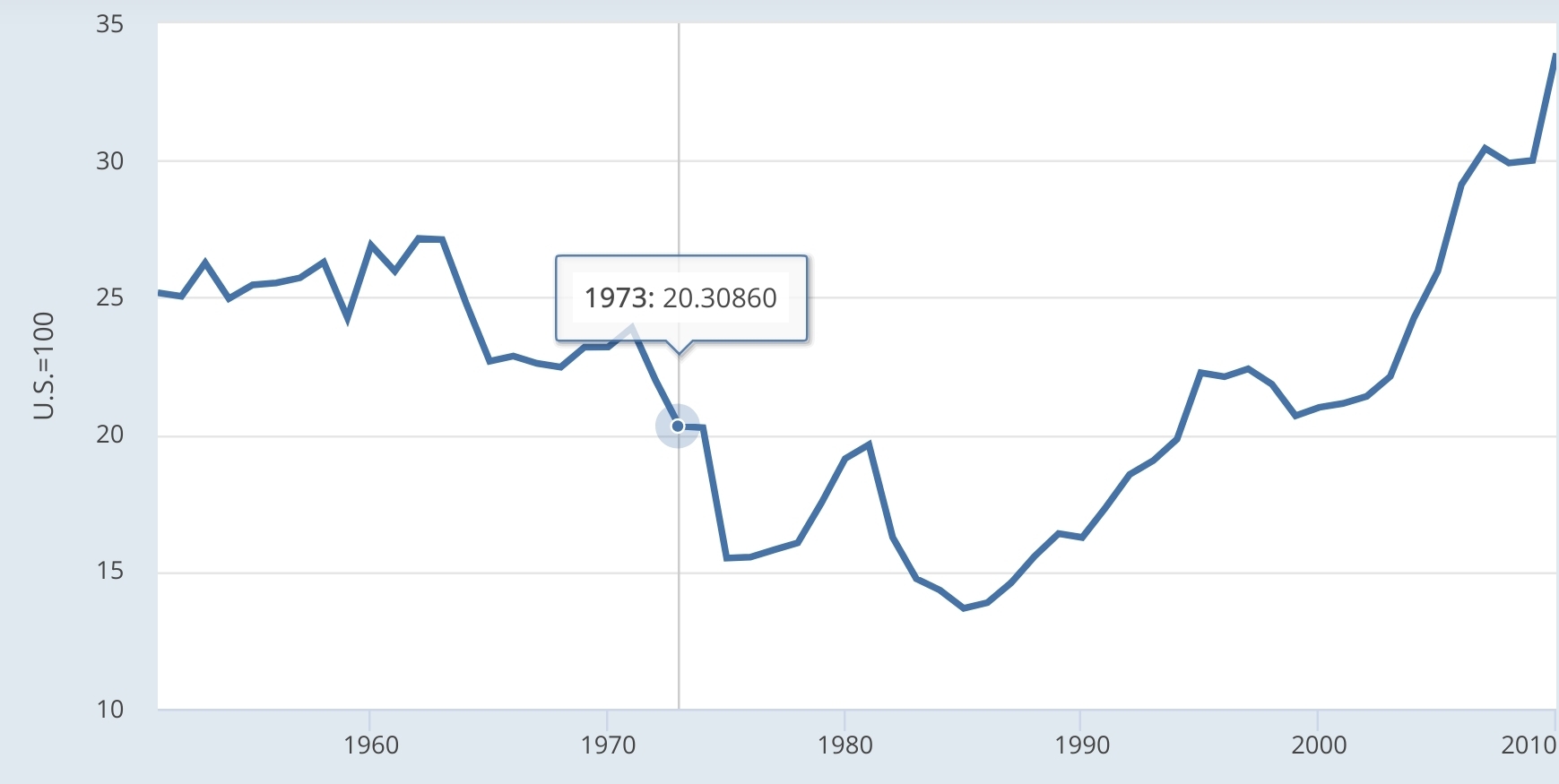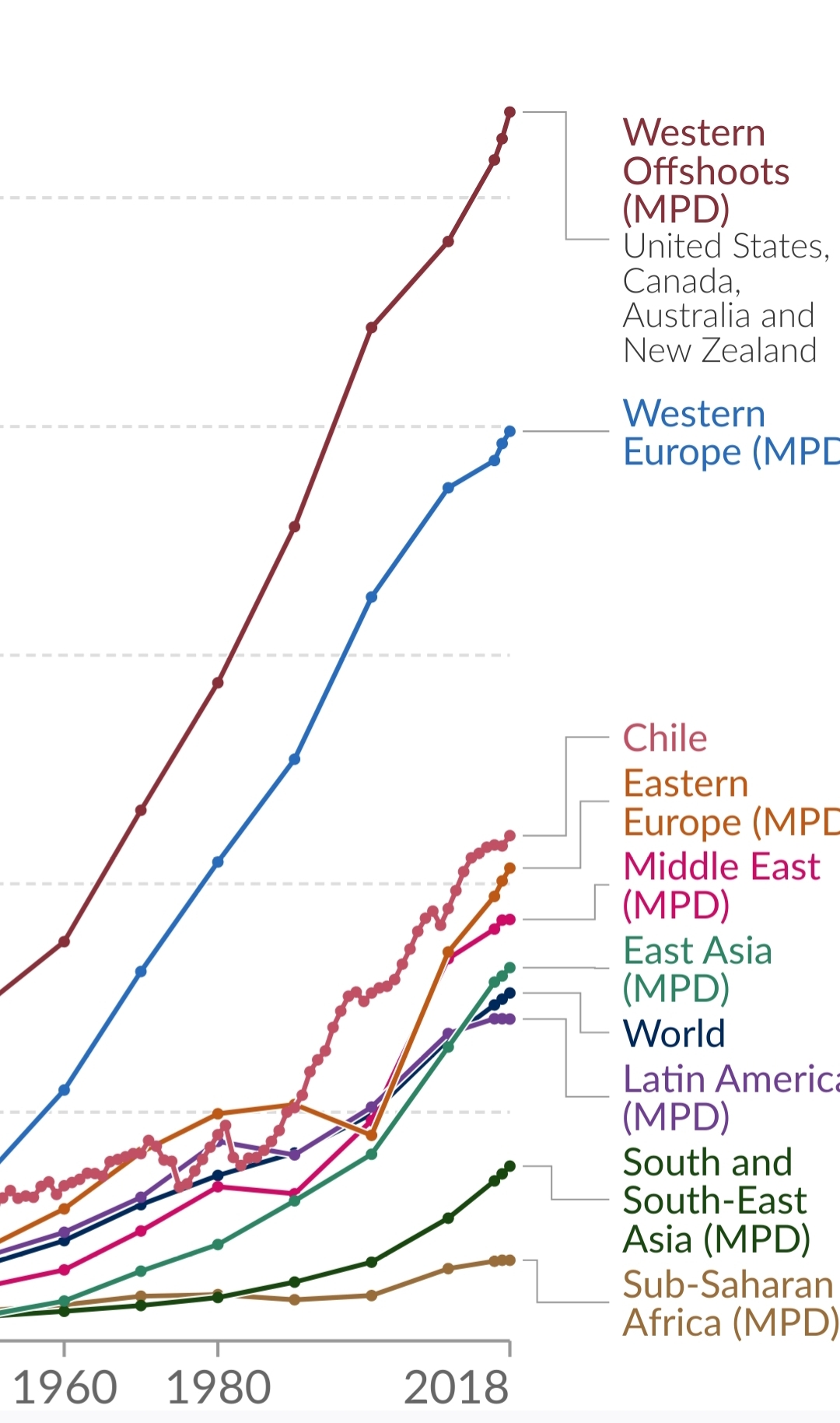
I’ve chosen this graph to illustrate the failure of Augusto Pinochet policies from 1973 to 1990(, whose personal wealth increased though and, more importantly, the western exploitation of Chile continued).
I didn’t chose that graph, more known, because “numbers go up” doesn’t seem trustworthy, while hiding the widening gap.

For reference, you probably already know that S.Allende died 50 years ago, the 11th of September 1973. He was elected president less than three years prior, at the end of 1970.
Here’s the speech excerpts :
« But Chile is also a country whose ret*rded[, can’t post without the *,] economy has been subjected and even alienated to foreign capitalists firms, resulting in a foreign debt of more than US$ 4,000 million whose yearly services represent more than 30 per cent of the value of the country’s exports;
The nationalization of basic resources constitutes an historic demand. Our economy could no longer tolerate the subordination implied by having more than 80 per cent of its exports in the hands of a small group of large foreign companies
These same firms that exploited Chilean copper for many years made more than US$ 4,000 million in profits in the last 42 years alone, while their initial investments were less than US$ 30 million.
From the very moment of our election victory on 4 September 1970, we were affected by the development of large-scale foreign pressures.
There have been efforts to isolate us from the world, strangle the economy and paralyze the sale of copper, our main export product, and keep us from access to sources of international financing.
We realize that when we denounce the financial-economic blockade with which we were attacked, it is hard for international public opinion and even for many of our compatriots to easily understand the situation because it is not open aggression, publicly proclaimed before the whole world. Quite the contrary, it is a sneaky and double-crossing attack, which is just as damaging to Chile.
We are not the object of any trade ban. Nobody has said that he seeks a confrontation with our country. It would seem that our only enemies or opponents are the logical internal political ones.
That is not the case. We are the victims of almost invisible actions, usually concealed with remarks and statements that pay lip service to respect for the sovereignty and dignity of our country.
In the last 12 months, the decline in the international price of copper has represented a loss of about US$ 200 million in income for a nation whose exports total a bit more than US$ 1,000 million
[He also mentions the interruption of $130M of annual loans from the World Bank and the USAID, and $220M more from private US banks, which « has resulted in important restrictions in our balance of payments »]
Just like most of the nations of Latin America, because of technological reasons and other factors, Chile must make important purchases of capital goods in the United States. Now, both the financing of the supplies and that normally provided by the Eximbank for this type of operation has also been suspended for us [so they now have to pay everything in advance and in cash]
Last July the world learned with amazement of different aspects of a new plan of action that the International Telegraph and Telephone Company(I.T.T.) had presented to the US Government in order to overthrow my Government in a period of six months. I have with me the document, dated in October 1971, that contains the 18-point plan that was talked about. They wanted to strangle us economically, carry out diplomatic sabotage, create panic among the population and cause social disorder so that when the Government lost control, the armed forces would be driven to eliminate the democratic regime and impose a dictatorship.
ITT’s refusal to accept a direct agreement and knowledge of its sneaky manoeuvres has forced us to send to Congress a bill calling for its nationalization.
Distinguished representatives, before the conscience of the World I accuse ITT of trying to provoke a civil war in my country -the supreme state of disintegration for a country. This is what we call imperialist intervention.
[After talking about another nationalized company, Kennecott Copper Corporation] The world community, organized under the principles of the United Nations, does not accept an interpretation of international law, subordinated to the interests of capitalism, that will lead the courts of any foreign country to back up a structure of economic relations at the service of the above-mentioned economic system. If that were the case, there would be a violation of a fundamental principle of international life: that of non-intervention in the internal affairs of a state
Since it could not be any other way, in the courts of Paris we have obtained the lifting of the embargo that had been in effect on the payment of a shipment of our copper.
There is also an evident effort to create a climate of distrust among the buyers of our main export product, but this will fail.
The aggression of the big capitalist firms seeks to block the emancipation of the people.
In just one year, these firms withdrew profits from the Third World that represented net transfers in their favour of $1,743 million : $1,013M from Latin America; $280M from Africa; $376M from the Far East; and $74m from the Middle East.
The place where they may be does not constitute any kind of link; the only thing they are interested in is where they make profits. (…) The large transnational firms are prejudicial to the genuine interests of the developing countries, and their dominating and uncontrolled action is also carried out in the industrialized countries, where they are based.
In the main, it was those acts that led the Economic and Social Council of the United Nations -following the denunciation made by Chile- to unanimously approve, last July, a resolution that called for a group of world figures to meet and study the effects and function of transnational corporations in the process of development, especially in the developing countries.
The spokesman for the African group at the Trade and Development Board a few weeks ago announced the position of those countries towards the denunciation made by Chile of Kennecott’s aggresion, reporting that his group fully supported Chile, because it was a problem which did not affect only one nation but, potentially, all of the developing world. These words have great value, because they represent the recognition of an entire continent that through the Chilean case, a new stage in the battle between imperialism and the weak countries of the Third World is being waged.
The battle in defence of natural resources is but a part of the battle being waged by the countries of the Third World against underdevelopment.
Two years ago, on the occasion of the 25th anniversary of the founding of the United Nations, the UN General Assembly solemnly proclaimed the strategy for a second decade of development. In keeping with this strategy, all UN member states pledged to spare no efforts to transform, via concrete measures, the present unfair international division of labour and to close the vast economic and technological gap that separates the wealthy countries from the developing ones.
We have seen that none of those aims ever became a reality. On the contrary, the situation has worsened.
Thus, the markets of the industrialized countries have remained as tightly closed as they ever were to the basic products - chiefly the agricultural products - of the developing countries and the index of protectionist measures is on the increase. The terms of exchange continue to deteriorate, the system of generalized preferences for the exportation of our manufactured and semi-manufactured goods has never been put into effect by the nation whose market - considering its volume- offered the best perspectives and there are no indications that this will be done in the immediate future.
The transfer of public financial resources, rather than reaching 0.7 per cent of the gross national product of the developed nations, has dropped from 0.34 to 0.24 per cent. The debt contracted by the developing countries, which was already enormous by the beginning of this year, has skyrocketed to between $70 and $75 thousand million in only a few months. The sums for loan services paid by those countries, which represent an intolerable drain for them, have been to a great measure the result of the conditions and terms of the loans. In 1970, these services increased 18 per cent and, in 1971, 20 per cent — more than twice the mean rate for the 1960 decade.
This is the drama of underdevelopment, and of the countries which have not stood up for their rights, which have not demanded respect for their rights and defended, through a vigorous collective action, the price of their raw materials and basic products and have not confronted the threats and aggressions by neo-imperialism.
We are potentially wealthy countries, and yet we live a life of poverty. We go here and there, begging for credits and aid, and yet we are – a paradox typical of the capitalist economic system – great exporters of capital.
The consensus at Vina del Mar, in 1969, pointed out (…) the great injustices that are being committed against the region under the disguise of cooperation and aid.
The deficit[ of every south american country] increases with every passing year in keeping with the population increase.
Recent data given by the International Monetary Fund shows that private investment by the developed countries in Latin America shows a deficit against Latin America of $9,000 million between 1960 and 1970, that amount represents a net contribution of capital from our region to the wealthy world in one decade.
Those who make peaceful revolution impossible make violent revolution inevitable.
Chile is not alone. All attempts to isolate her from the rest of Latin America and the world have failed. (…) To all of these countries, we express our most deep-felt gratitudes. »

